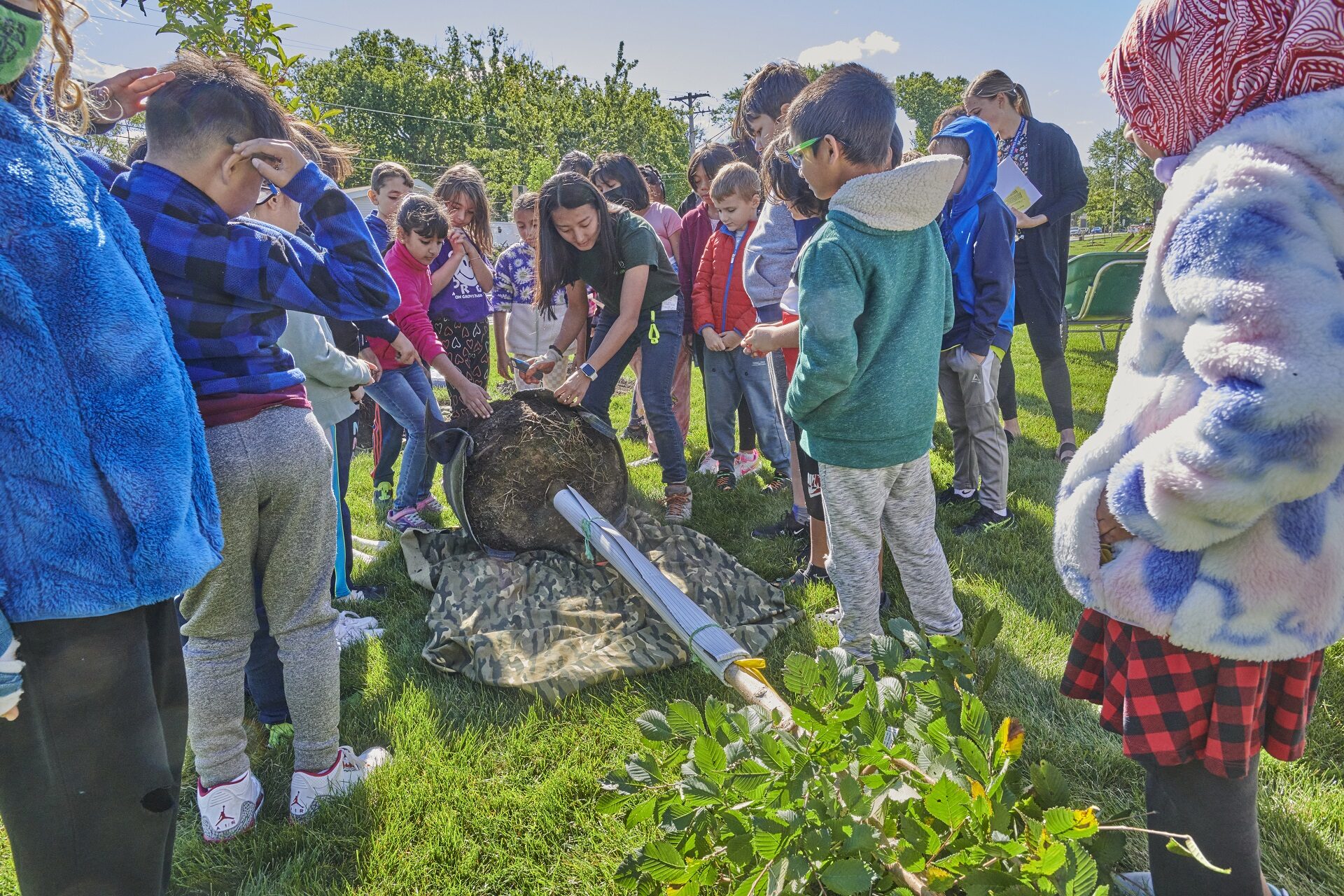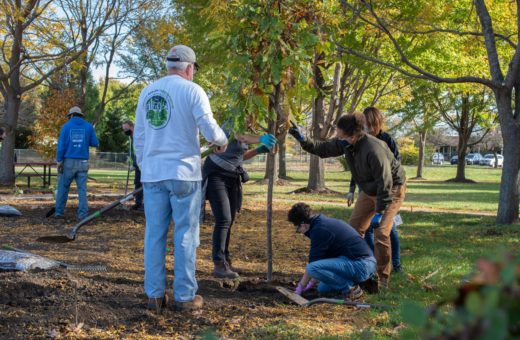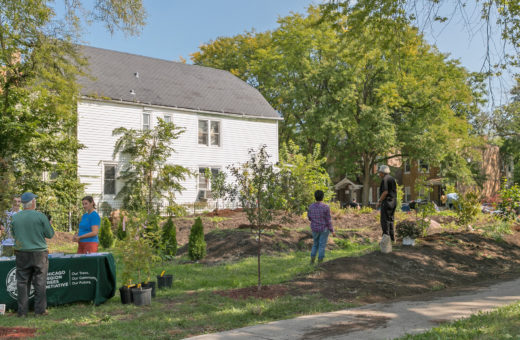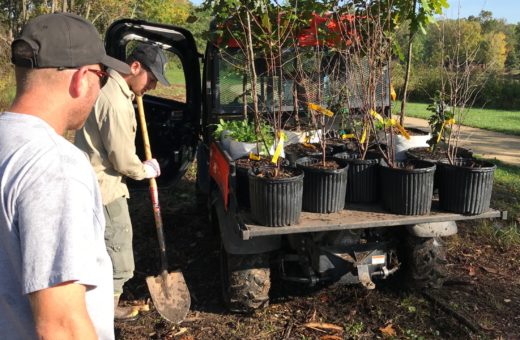Overview
LISLE, Ill. (April. 25, 2024)— This Arbor Day, April 26 in Illinois, The Morton Arboretum is urging cities, businesses and organizations to support local tree planting to mitigate the impacts of climate change on communities and people. Arbor Day was established in 1872 by the father of the Arboretum’s founder, Joy Morton. The Morton family motto was “Plant Trees.”
Arboretum President and CEO Jill Koski said that Arbor Day is an important opportunity to raise awareness of the significant climate-mitigating impact community members can make by working together to plant and properly care for trees.
“Small-scale tree plantings are making a big difference in urban areas, especially in disadvantaged communities with fewer trees and inequitable access to green infrastructure,” Koski said. The Arboretum’s tree experts say that the key to the success of these efforts is communities having the resources and capacity needed to properly care for newly planted trees so that they stay healthy and grow to maturity when the greatest benefits are achieved. Koski said, “The Arboretum is partnering with communities to plant the right trees in the right places and give them the right care to gain their many climate resilience benefits such as stormwater management, cooler streets, cleaner air and ecosystem protection, to name just a few.”
Research by The Morton Arboretum’s scientists and others revealed that properly placed, diverse and cared for trees can cool temperatures in built environments and sustain biodiverse ecosystems, among other benefits. “Improving and maintaining a healthy, mature tree canopy is one of the most cost-effective tools cities have to mitigate the impacts of urban heat islands,” Koski said.
In 2014, the Arboretum, in collaboration with Openlands and other partners, founded the Chicago Region Trees Initiative (CRTI) after the region’s first-ever tree census in 2010 revealed that the area’s urban forest was facing multiple threats, including climate change, pests and invasive species. Now celebrating its 10th anniversary, the Arboretum’s program has become the largest urban and community forestry initiative of its kind in the nation, partnering with more than 500 municipalities, community groups and others to increase tree advocacy, planting and care. The Arboretum also led the first comparative Chicago Region Tree Census in 2020, continuing targeted action to boost the tree canopy, largely in underserved disadvantaged communities.
Since 2019, when CRTI began tracking its tree planting and distribution in the seven-county Chicago area, it has distributed 1,579 saplings to community members and planted more than 6,000 trees at more than 150 sites.
“Most of the plantings we support are for less than 30 trees at a time, with an emphasis on building our partners’ capacity to provide long-term care,” said Zach Wirtz, director of CRTI. “Disadvantaged communities that have not had the same resources as others to invest in green infrastructure are increasingly advocating for the funding and support services they need to not only plant trees but to care for them so they grow to maturity to deliver the most benefits.”
In December 2023, the Arboretum opened applications for $6.86 million in competitive subgrants to increase tree canopy, improve forest health and create or enhance community forestry programs in disadvantaged areas of the state, through funding provided by the United States Department of Agriculture Forest Service through the Inflation Reduction Act (IRA) under the direction of the Illinois Department of Natural Resources.
Congressman Sean Casten led the Illinois delegation’s support for The Morton Arboretum to obtain this funding to benefit local communities. “Increasing and improving the urban and community forest is essential to mitigating the effects of climate change and ensuring a more resilient future,” said Rep. Casten. Adding, “The Morton Arboretum is playing a key role in convening public and private partners to increase our urban canopy.”
“Applications exceeded the funding available, which demonstrates the interest Illinois communities have in accessing the benefits of trees,” Wirtz said. “We will work to support many of those communities and others with the additional $15 million in IRA funding the Arboretum received directly from the US Forest Service.” Grant recipients will be notified this spring, with new funding application opportunities to be announced in the coming months.
Through Arbor Day and into the May planting season, CRTI is working with 19 communities to plant or distribute 44 trees. On Sunday, April 28, CRTI will be supporting the Student Conservation Association (SCA) in planting 20 trees in Berwyn’s Proska Park, along with dozens of volunteers, including Olympic gold medalist gymnast Aly Raisman. “Trees are an important necessity, especially in urban areas. They provide shade, reduce air pollution and improve mental health,” said SCA President and CEO Lidia Soto-Harmon. “Planting trees not only beautifies the city, but it’s also creating a healthier and sustainable environment for generations to come.”
In May, Chicago Heights will be planting 150 trees throughout the community to provide the benefits of trees to more residents. “Trees are a vital part of our city landscape and create a peaceful and appealing setting in our neighborhoods and parks,” said Mayor David Gonzalez. “In addition, trees add to our quality of life by moderating the climate, improving air quality and conserving water and soil. We are extremely grateful to The Morton Arboretum for the resources and guidance they’ve provided as we collaborate on the citywide planting project in celebration of trees and our community.”
Last year alone, CRTI hosted or supported more than 500 events, including tree plantings, site visits, presentations, tree walks and workshops in more than 200 communities. Among its collaborative initiatives, CRTI and Faith in Place initiated the WaukGrow program in 2022, which has engaged key stakeholders and community centers in Waukegan to assess interest, viability and support for urban food forests at houses of worship and local schools. Their efforts have resulted in 22 fruit and nut trees and eight saplings planted with the help of students at Waukegan’s John R. Lewis Middle School, and 27 trees at Most Blessed Trinity Holy Family Church to support their food pantry and soup kitchen, among other planting locations. CRTI continues to support this and other food forest initiatives in part through its free Food Forest Plant Care Training—available online in both English and Spanish—that provides resources for starting a food forest.
“This important work to improve equitable access for everyone to the benefits of trees is rooted in community partnerships,” Wirtz said. “We’ve built lasting relationships over the past 10 years that have helped create a healthier, more diverse and more equitably distributed urban forest that will help sustain communities against the long-term impacts of climate change.”



